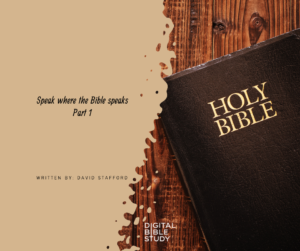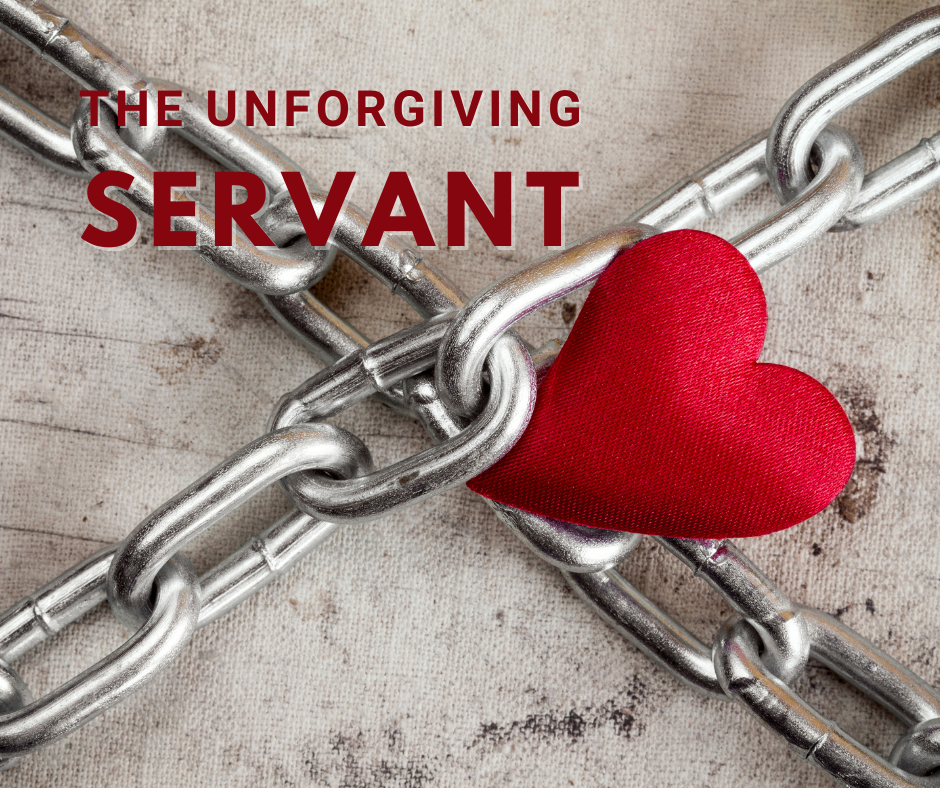Will You Be a Forgiving Servant?
Written by: Jameson Steward
Do you remember when you were first forgiven of your sins by God?
When you arose after being buried with Christ in baptism, having been set free from sin by the blood of Jesus (Romans 6:1-7), wasn’t that the most amazing moment of your life? What a burden Jesus lifted at Calvary!
After obeying the Gospel, we discovered that we still stumble occasionally. We still need the blood of Christ cleansing us from all sin (1 John 1:5-2:2). As a Christian who still sins at times despite my best efforts not to, it’s comforting to know I’m still walking with God because of my Advocate with the Father.
Forgiveness fills our lives with joy and peace.
But what if we are unwilling to extend forgiveness to others? Jesus told the Parable of the Unforgiving Servant (Matthew 18:21-35) to illustrate the importance of His servants practicing forgiveness.
The Parable
There was a servant who owed his master more money than he could ever hope to repay in his lifetime. As his master was about to sell him, along with his family, to recoup whatever he could for the servant’s debt, the servant begged his master for patience.
The master was moved with compassion for this poor servant and forgave him everything he owed. What a weight that had been lifted off that servant’s shoulders! What joy he must have felt in that moment – he had been forgiven of a debt he could have never repaid!
However, the parable takes a sad turn.
This same servant came across one of his fellow servants who owed him an amount that could have been repaid within a few years. When his fellow servant asked for patience, our recently forgiven servant had this poor man thrown into prison until he could pay his debt. The other servants saw what happened and reported the recently forgiven servant’s actions to the master.
The one who had received mercy for his enormous debt was unwilling to extend this same mercy to another for a much smaller debt. The unforgiving servant was delivered by his master to the torturers until the debt was fully paid (it would never be paid).
The Point
Most of Jesus’ parables have one central point, and the Parable of the Unforgiving Servant is no different. After telling of the servant who was delivered to the torturers for refusing to forgive his fellow servant, Jesus drove the point home to his listener’s hearts.
So My heavenly Father also will do to you if each of you, from his heart, does not forgive his brother his trespasses.
Matthew 18:35
That’s not a sermon conclusion with a sugar-coated main point. Jesus was often direct and blunt – and this occasion is no different. He taught with love, but Jesus also taught to challenge His listeners.
The Application
Forgiving others from our hearts mean we must have an attitude of forgiveness.
We must desire to forgive others – just as God desires to forgive sinners.
The Lord is not slack concerning His promise, as some count slackness, but is longsuffering toward us, not willing that any should perish but that all should come to repentance.
2 Peter 3:9
Since God wants sinners to repent of their sin – doesn’t that imply He wants to forgive them? How can we wear the name “Christian” if we are unwilling to be like Christ?
Christians often criticize those who cry, “Give me Jesus, but not the church,” and rightfully so. The church is the Lord’s body (Ephesians 1:22-23), so it’s impossible to claim Christ and leave out His church.
Friends, it’s every bit as unbiblical to claim salvation through the blood of Christ while refusing to be like Christ. To be a Christian (Acts 11:26) means to be a follower of Christ. We are supposed to be His disciples, enrolled in His school, growing to be more like Him (Matthew 28:18-20).
Forgiving others requires us to be humble as a little child (Matthew 18:1-5).
If we are full of pride, then we will not be able to forgive others as God has forgiven us. Pride-filled people think of themselves first. A prideful person would only focus on how they had been wronged.
Little children are quick to forgive their siblings or friends when they’ve been mistreated. A little child can be pushed down by their sibling one moment and quickly forgive them the next when their sibling apologizes. What an example to us “grown folks” who sometimes hold grudges for years over just a few said words.
Forgiving others means we must understand how valuable each soul is to God (Matthew 18:6-14).
That person at work who is overly critical of every idea you have, makes fun of you behind your back, and undermines your efforts in front of your boss? Their soul is infinitely valuable to God.
What about that selfish family member who always wants everything done their way and is quick to let you know when they don’t like what you’ve done? Their soul is worth more than the whole world.
To be like Christ in practicing forgiveness, we must see people how God sees them.
Forgiving others means we must be willing to go to great lengths to bring one lost soul back to God (Matthew 18:15-20).
I’m reminded of what Jesus did to bring us back to God.
For you know the grace of our Lord Jesus Christ, that though He was rich, yet for your sakes He became poor, that you through His poverty might become rich.
2 Corinthians 8:9
Let this mind be in you which was also in Christ Jesus, who, being in the form of God, did not consider it robbery to be equal with God, but made Himself of no reputation, taking the form of a bondservant, and coming in the likeness of men. And being found in appearance as a man, He humbled Himself and became obedient to the point of death, even the death of the cross.
Philippians 2:5-8
When we are tempted to think, “So-and-so is too much trouble to try and bring back to God,” remember how much “trouble” Jesus went through for you.
If we do not forgive our brethren from our heart (mind), then we are just like the unforgiving servant, and we will face similar consequences, only our fate will be eternal punishment (Matthew 25:46).
How can we – who have been forgiven so much by God – refuse to extend forgiveness and mercy to those who come asking for mercy and forgiveness?
As Christians, let us be like Christ and be forgiving servants.

Jameson Steward
Jameson Steward is married to Ashley Steward. They both grew up in Tupelo, MS. Jameson
preaches for the West Hobbs Street Church of Christ in Athens, AL. Jameson and Ashley have
three children: Nate, Casen, and Ava Drew. Jameson is a graduate of the University of
Mississippi and the Memphis School of Preaching.

Applications of Jesus’ Example Prayer
Prayer is such an important part of our Christian walk. It is our way of communicating with our Heavenly Father. So, do not neglect it. Pray to Him. Talk to Him. Use the aspects we identified in Jesus’ example prayer to guide you in your prayers.

Are We Speaking Where the Bible Speaks? Part 1
There is an important question that needs to be addressed, and that question is “Are we speaking where the Bible speaks?”

Boundaries in Christianity
Take a moment to think on areas of your life where you may already have boundaries set to help keep yourself closer to God. Also, take some time to consider areas of weakness that you may be able to develop boundaries for to help keep you distanced from tempting situations and more focused on sticking to the path of righteousness.

